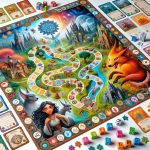Strategy board games are not just a source of entertainment for children, but they also play a crucial role in enhancing cognitive skills. These games require players to strategize, plan ahead, and make critical decisions, making them beneficial for the development of problem-solving and critical thinking abilities. By engaging in strategy board games, kids can sharpen their analytical skills and learn to anticipate consequences of their actions.
The benefits of strategy board games for kids are numerous. Apart from improving cognitive skills, these games also help enhance memory retention, attention span, and strategic thinking. Additionally, playing strategy board games can boost creativity and overall mental development in children. It is an engaging and interactive way for kids to learn valuable skills that will benefit them both academically and in real-life situations.
When it comes to selecting the right strategy board game for your child, it is essential to consider factors such as age appropriateness, complexity level, and theme preferences. There is a wide variety of strategy board games available for different age groups, each offering unique challenges and learning opportunities. By choosing the right game that caters to your child’s interests and skill level, you can ensure an enjoyable experience that also aids in their overall growth and development.
Benefits of Strategy Board Games
Strategy board games offer numerous benefits for kids beyond just entertainment. These games are not only fun but also help in the development of various cognitive skills that are essential for their growth and learning. Here are some key advantages of playing strategy board games for children:
- Enhanced critical thinking: Strategy board games require players to think ahead, anticipate outcomes, and make decisions based on their goals. This helps children enhance their critical thinking skills as they strategize and plan their moves.
- Improved problem-solving: By facing challenges and obstacles in strategy board games, kids are encouraged to find creative solutions to overcome them. This fosters their problem-solving abilities and teaches them to approach problems from different angles.
- Develops decision-making skills: Making decisions is a crucial skill that children need to learn early on. Strategy board games provide a safe environment for kids to practice making decisions, weighing options, and understanding consequences.
Moreover, playing strategy board games can also enhance other important skills such as concentration, patience, analytical thinking, and emotional regulation. By engaging in these games, children not only have fun but also unknowingly improve themselves in various aspects that will benefit them both academically and socially.
Lastly, strategy board games can be a great way to foster healthy competition among kids without taking away the element of cooperation and sportsmanship. As they learn to compete while respecting rules and opponents, children develop social skills like empathy, communication, and teamwork. Overall, the benefits of playing strategy board games for kids extend far beyond just having a good time – they contribute significantly to their overall development and growth as individuals.
Top Strategy Board Games for Kids
Beginner (Ages 4-6)
For younger children, games like “Candy Land” and “Chutes and Ladders” are excellent introductory strategy board games. These games teach basic skills such as color recognition, counting, and turn-taking while also introducing the concept of gameplay strategy in a fun and easy-to-understand manner.
Intermediate (Ages 7-10)
Kids in this age group can enjoy slightly more complex strategy board games like “Ticket to Ride: First Journey” and “Robot Turtles.” These games require more strategic thinking, planning, and decision-making skills from the players. “Rat-A-Tat Cat” is another popular choice for this age group as it combines elements of luck and strategy.
Advanced (Ages 11+)
Older children who are looking for a challenge can delve into games like “Settlers of Catan” and “Risk.” These games involve more elaborate strategies, critical thinking, negotiation skills, and long-term planning. “Codenames” is another favorite among tweens and teens as it encourages communication, teamwork, and deduction skills.
By selecting strategy board games that are age-appropriate and gradually increasing complexity as kids grow older, parents can help enhance their children’s cognitive abilities while providing them with hours of entertainment.
Whether your child prefers fantasy-themed adventures or science fiction settings, there is a wide range of strategy board games available to suit every taste and skill level. Introducing kids to these engaging games at an early age can not only be a fun bonding experience for the family but also help them develop valuable skills that will benefit them throughout their lives.
How to Choose the Right Strategy Board Game for Your Child
When it comes to selecting the right strategy board game for your child, there are a few key factors to consider to ensure that they not only have fun but also benefit from playing the game. One important aspect to keep in mind is the age appropriateness of the game.
Different strategy board games are designed for different age groups, so choose one that matches your child’s developmental stage. This will help prevent frustration and ensure that they can grasp the rules and strategies involved.
Educational Value
Consider the educational value of the strategy board game you are choosing for your child. Look for games that require critical thinking, problem-solving, and decision-making skills. These types of games can help improve cognitive abilities and enhance their learning experience while having fun. Some strategy board games are even designed specifically to teach math, language, or other subjects in an interactive way.
Theme and Interest
Another crucial factor to consider when choosing a strategy board game for kids is their interests and preferences. Kids are more likely to engage with a game that aligns with their favorite themes such as fantasy, space exploration, animals, or historical events. By selecting a game with a theme they enjoy, children will be more motivated to learn and strategize while playing. This can also create opportunities for bonding over shared interests between parents or siblings during gameplay.
Tips for Teaching Strategy Board Games to Kids
Playing strategy board games can be a great way to engage children in critical thinking and problem-solving while having fun. When introducing kids to strategy board games, it is essential to make the experience enjoyable and educational. One tip for teaching strategy board games to kids is to start with games that are age-appropriate and have simple rules. This can help children grasp the basic concepts of strategic thinking without feeling overwhelmed.
Another important aspect of teaching strategy board games to kids is to explain the rules clearly and patiently. Children may take some time to understand the guidelines and objectives of the game, so it is crucial to provide clear instructions and guidance throughout the gameplay. Encouraging kids to ask questions and participate actively in discussions about strategies can also enhance their learning experience and improve their critical thinking skills.
Additionally, creating a supportive and encouraging environment while playing strategy board games with kids can make the experience more enjoyable and effective. As children explore different strategies and tactics during gameplay, it is essential to praise their efforts regardless of whether they win or lose. This positive reinforcement can boost their confidence, motivate them to keep trying, and ultimately improve their strategic thinking abilities.
| Tip for Teaching Strategy Board Games | Effect on Kids’ Learning |
|---|---|
| Start with age-appropriate games | Helps children grasp basic strategic concepts without feeling overwhelmed |
| Explain rules clearly and patiently | Enhances understanding of game objectives and improves critical thinking skills |
| Create a supportive environment | Boosts children’s confidence, motivates them to keep trying, and enhances strategic thinking abilities |
Strategies for Winning
Playing strategy board games can be a fun and engaging way for kids to enhance their cognitive skills and strategic thinking abilities. As children navigate through the challenges presented in these games, they learn to think critically, plan ahead, and make informed decisions. By employing tactics and strategies, kids can improve their gameplay and increase their chances of winning.
One key tip for kids playing strategy board games is to carefully study the rules and objectives of the game before starting. Understanding the game mechanics is essential for making sound decisions during gameplay. Additionally, teaching children the importance of patience and perseverance can help them handle setbacks or unexpected outcomes in a more constructive manner.
Another effective strategy for winning at strategy board games is to encourage kids to anticipate their opponents’ moves and plan accordingly. By thinking several steps ahead and predicting possible outcomes, children can develop their predictive skills and strategic foresight. This not only enhances their gameplay but also fosters their ability to adapt to changing circumstances during the game.
| Key Strategy | Benefits |
|---|---|
| Studying Rules | Improved decision-making skills |
| Anticipating Opponents’ Moves | Enhanced predictive skills |
By instilling these tactics and tips in children while playing strategy board games, parents and educators can help them build essential skills such as critical thinking, problem-solving, and strategic planning. Moreover, winning or losing in these games teaches valuable lessons about sportsmanship, resilience, and good sportsmanship. Ultimately, strategy board games serve as effective tools for developing children’s cognitive abilities while having fun with friends and family.
The Social Aspect of Playing Strategy Board Games
Playing strategy board games is not only a fun and engaging activity for kids, but it also offers numerous social benefits that can help in their overall development. One of the key advantages of playing these games is the promotion of teamwork among children.
By working together to come up with strategies and make decisions, kids learn how to collaborate effectively and achieve common goals. This collaborative aspect of strategy board games helps in fostering a sense of unity and cooperation among young players.
Moreover, communication skills are another important aspect that can be enhanced through playing strategy board games. Whether it’s discussing tactics, sharing ideas, or negotiating moves with fellow players, children are constantly engaging in verbal communication during gameplay. This helps them learn how to express their thoughts clearly, listen to others, and convey their ideas effectively. As a result, kids can develop strong communication skills that are essential for both personal relationships and academic success.
Aside from teamwork and communication, playing strategy board games also facilitates bonding among children. When kids gather around a game board, they have the opportunity to spend quality time together, share experiences, and create lasting memories.
These shared experiences strengthen friendships, build emotional connections, and promote a sense of camaraderie among young players. In a world dominated by digital devices and screen time, strategy board games provide a valuable opportunity for kids to interact face-to-face and form meaningful relationships with their peers through healthy competition and shared enjoyment.
- Enhances teamwork skills
- Improves communication abilities
- Promotes bonding among children
Educational Value of Strategy Board Games
In conclusion, strategy board games for kids offer a myriad of educational benefits that go beyond mere entertainment. By engaging in these games, children can enhance crucial skills such as critical thinking, problem-solving, and decision-making. These games challenge young minds to think strategically, anticipate consequences, and adapt their tactics to achieve success. Therefore, incorporating strategy board games into a child’s playtime can serve as a valuable tool for cognitive development.
Moreover, playing strategy board games can also foster social interaction and communication among children. Through teamwork and collaboration in these games, kids learn how to work together towards a common goal, making decisions collectively, and communicating effectively with their peers. These experiences not only promote positive social skills but also help in the overall emotional development of children as they navigate through different social dynamics while playing these games.
Ultimately, the educational value of strategy board games cannot be overstated. Parents and educators should recognize these games as more than just recreational activities but rather as tools for fostering essential skills in children.
By encouraging kids to engage in strategy board games regularly, we are not only providing them with enjoyable pastimes but also equipping them with valuable life skills that will benefit them academically and socially well into the future. So next time you’re pondering a gift for a child or searching for an engaging activity, consider the lasting impact that a strategy board game can have on their growth and development.
Frequently Asked Questions
What Is the Best Strategy Game for Beginners?
The best strategy game for beginners would be something like “Ticket to Ride” or “Carcassonne” as they are relatively easy to learn and provide a good introduction to strategic thinking without being too overwhelming.
What Is the Strategy Game for 9 Year Old Boy?
A great strategy game for a 9-year-old boy would be “Risk Junior” or “King of Tokyo.” Both games are designed to be engaging for younger players while still incorporating strategic elements that can help develop critical thinking skills.
What Is the Most Popular Strategy Board Game?
The most popular strategy board game is likely “Settlers of Catan.” This game has gained widespread popularity due to its blend of resource management, negotiation, and strategic decision-making. It has become a staple in many board game collections around the world.

I love playing all kinds of games – from classics like Monopoly to modern favourites like Ticket to Ride.
I created this blog as a way to share my love of board games with others, and provide information on the latest releases and news in the industry.





